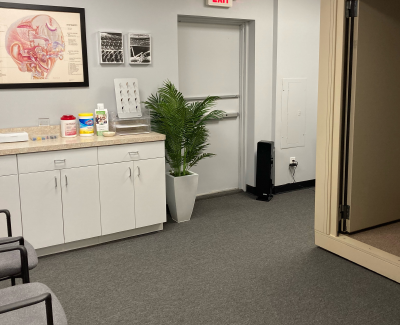
There is a misconception that tinnitus is untreatable, nothing can be done and you just have to learn to live with it. After specializing in tinnitus management for over 24 years, Dr. Maresca believes you do not have to learn to live with it.

Tinnitus is the term for noises heard in the ears or in the head. It may be described as a buzzing, ringing, whistling, hissing, or other types of sound. Tinnitus may be constant or episodic, high pitched or low pitched, steady in volume or fluctuating in volume. It may even change throughout the day in the type of sound you hear. Essentially, tinnitus can be very predictable or very erratic. Tinnitus is a natural phenomenon experienced by 50 million Americans. Persistent tinnitus, which becomes problematic, is experienced by approximately 30 million Americans.
Tinnitus is considered to be a brain disorder, not an ear disorder. Generally, both disorders originally stem from damage to the same area, the inner ear. Tinnitus and hearing loss are two different disorders, therefore they need to be addressed differently.
If you compare tinnitus experienced by a patient who does not consider it to be problematic, to a patient who does, there are no significant physical or medical differences. The difference lies in the part of the brain concerned with analyzing weak sound signals.
In many cases, a patient will experience normal tinnitus, which may easily give the idea that something is medically wrong or that they will be stuck with this problem for the rest of their life. This negative thinking is frequently responsible for the initial focusing of the subconscious part of the brain on the small tinnitus signals coming from the inner ear. This focus creates feelings of annoyance, apprehension, and even anxiety and depression. This is where the tinnitus cycle begins. The emotions, creating a physiological change in the body, increase the brain’s focus on the neurological signal creating a greater awareness of the tinnitus. This heightened awareness of the tinnitus increases the stress, anxiety, and negative emotions, which then again create a physiological change in the body, which increase the awareness of the tinnitus. Essentially, the more you hear it, the more stressed you get, the more stressed you get then the louder it becomes, and the louder it becomes the more you hear it, resulting in the more stressed you get. This is the cycle of tinnitus.

Tinnitus management is treatment based on our understanding of the three systems involved in tinnitus: the auditory system, the autonomic system, and the limbic system. Because the subconscious parts of the brain have become trained to focus on the weak electrical signals coming from the inner ear (neurological activity), it is necessary to retrain these subconscious filters. This retraining may be accomplished through a careful combination of counseling, guidance and sound therapy which may include sound generators, hearing aids, combination devices, SoundCure, Neuromonics, or environmental sound therapy.
In all cases, it is crucial to address both ears and to address the altered filtering of the neurological signals coming from the ear, by the brain. These filters can be reset so they do not transmit tinnitus messages to the hearing cortex (the subconscious part of the brain), which would result in tinnitus no longer being heard or a decrease in the general awareness of the tinnitus.

Hyperacusis is when people experience an increased sensitivity to loud sounds. They typically find that moderate sounds are uncomfortably loud and loud sounds are simply intolerable. In other cases, it is not the loudness of sounds, but the type of sound that people find uncomfortable. Reduced tolerance to sound is generated by an auditory dysfunction where external sounds are internally amplified. Retraining therapy may also be applied to hyperacusis where you are trying to retrain the brain to perceive sound at normal tolerance levels.
Follow-up visits are a crucial part of tinnitus/hyperacusis success. It is important to realize there is no overnight cure for tinnitus and hyperacusis, and treatment may take anywhere from 6 to 24 months.
What is retraining therapy?
The goal is to retrain the subconscious part of the brain to ignore the “sounds” and to reach the stage in which you are not aware of and/or annoyed by your tinnitus.
Are there any side effects of the treatment?
There are no side effects of tinnitus management.
What kind of audiological tests are performed? Will it hurt? What if I’m not experiencing tinnitus when I am tested?
We will perform an extensive hearing test, and several specific tinnitus tests which will allow us to determine whether you have tinnitus, hyperacusis, or any combination of these and to what degree. None of the testing is painful; we begin with low levels of sound which gradually become louder. If tinnitus is not present on the day of testing, it will not influence the possibility of success with treatment.
If I recently had audiological testing done, then does the test have to be repeated?
If it has been performed by an audiologist within the past 3 months then it does not. We do ask that you bring your previous audiological results so we don’t have to repeat any testing.
Is the counseling a form of psychotherapy or biofeedback?
The counseling will provide you with information about the causes and factors involved in your tinnitus/hyperacusis. We will also explain how tinnitus/hyperacusis management works, guide you through your treatment, and teach you how to control your tinnitus/hyperacusis. The counseling sessions are a fundamental part of the treatment process.
Can I just buy the devices?
The devices are used to help speed up the process of retraining, but what is important, is how they are used. How the devices are used depends on each patient’s individual needs. If you just buy and wear the devices, you probably won’t achieve improvement, and in some cases you may make your tinnitus worse. We will teach you how to properly use the devices so they are the most effective for you.
I’m using hearing aids; how can I use other devices?
It is possible for us to work with your current hearing aids depending on the type they are. In some cases, it is possible to utilize both hearing aids as well as other kinds of sound therapy at the same time, so we can incorporate your current devices into your treatment plan.
Can my mother benefit from tinnitus management if she is deaf?
This therapy uses sound as a part of the treatment. So, if your mother is completely deaf and does not have a cochlear implant, she would not be able to benefit from this therapy. However, the use of electrical stimulation of the ear (through a cochlear implant or external stimulation) combined with a tinnitus management program may help. If she can hear sound, even if she cannot recognize speech, we can try to help her.
Can I continue taking my medications?
Yes, you may continue your medications. We will examine all of your medications, as some may contribute to the tinnitus. If a medication you are taking seems to be linked to your tinnitus, then we will work with your prescribing physician to come up with an appropriate management plan.
How long does the treatment take?
Because every case is different, the treatment may last anywhere between 6 to 24 months.
Will my tinnitus be cured?
There is no guarantee, but approximately over 89% of people who undergo tinnitus management will no longer be bothered or annoyed by their tinnitus. For some patients that means they do not hear any tinnitus signal whatsoever. For other patients they may be aware of their tinnitus, but it is so minute they are not aware of it for the majority of the time. It is important to remember that tinnitus management is a treatment, not a cure. So if patients focus and concentrate on hearing their tinnitus, they will hear it.